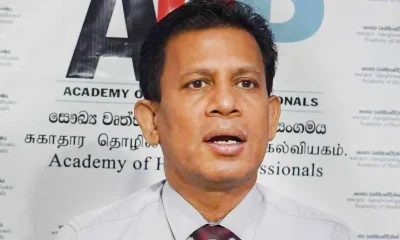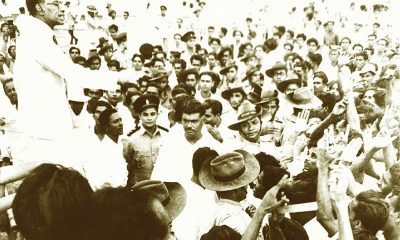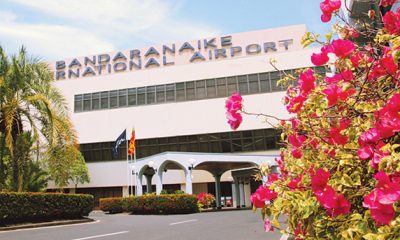Editorial
Mudalali Mafia

Friday 2nd June, 2023
Long lines of vehicles suddenly appeared near filling stations yesterday, evoking dreadful memories of a dark era and causing public panic. Pumps had run dry at most fuel depots, and people had to wait for hours to obtain petrol and diesel. Minister of Power and Energy Kanchana Wijesekera hurriedly issued a media statement denying rumours of a fuel shortage.
Minister Wijesekera tweeted that the country had adequate fuel stocks, but filling stations had not placed orders for petrol and diesel due to speculation about a downward fuel price revision. This is not the first time fuel station owners have done so. They have apparently become a law unto themselves, and the government takes no action against them. How does Minister Wijesekera propose to deal with them and ensure a reliable fuel supply? He should explore the possibility of revoking their licences.
Besides, filling stations are notorious for various malpractices, and cheat their customers with impunity. Most of them remain closed at night much to the inconvenience of the public though fuel should be freely available anytime of the day. The situation has taken a turn for the worse since last year’s fuel crisis. It is doubtful whether filling stations are regulated at all. How can a country achieve its development goals unless there is a reliable fuel supply?
The incumbent dispensation is all out to neutralise threats to its rule on the political front. It allocates resources for riot control generously, and thousands of police and military personnel are deployed at the first sign of a protest. It may be able to keep the meek Opposition in check, but its failure to tame the mudalali Mafia is bound to be its undoing. It cannot even control egg traders, who are apparently running a parallel government, defying as they do consumer protection laws.
More worryingly, now that the recent disruptions to the fuel supply have exposed the impotence of the Ministry of Power and Energy vis-à-vis the filling stations including those under the state-owned CPC (Ceylon Petroleum Corporation), the question is whether the government will have any control over the fuel stations to be set up by foreign companies.
Elephantine shame!
The SLPP-UNP government has embarked on a crusade to protect Buddhism. It has caused a comedienne and a social media activist to be arrested for allegedly insulting the Buddha. Sri Lankan leaders claim to be guided by the tenets of Buddhism, and never miss an opportunity to make a public display of their religiosity? If so, how come this country has earned notoriety for cruelty to animals besides blatant human rights violations?
The suffering of an elephant here has received international media attention, which has prompted Thailand, which gifted the animal to this country years ago, to step in to save it.
Those who are responsible for looking after the poor Thai jumbo must be called to account for serious lapses on their part. The government of Thailand deserves praise for its concern for the poor elephant languishing here. Its efforts to have the ailing jumbo flown back home for treatment are to be highly appreciated however embarrassing they may be to the Sri Lankan authorities. This, however, does not mean that animals do not undergo suffering at the hands of humans in Thailand, which also describes itself as a Buddhist country.
Let the government of Sri Lanka be urged to intervene to ensure that the ailing elephant in the news is looked after properly, and tender an unqualified apology to Thailand and animal lovers who have rightly taken up the cudgels on its behalf.
Animals must be allowed to live in their natural habitats, which should be protected. They are not exhibits to be kept in zoos or paraded for human entertainment, especially in a predominantly Buddhist country.
Editorial
Executive brinkmanship

Pressure is mounting on President Anura Kumara Dissanayake to ensure that an Auditor General is appointed without further delay. But he has remained unmoved. He is determined to wear down the Constitutional Council (CC) and appoint one of his party loyalists as Auditor General. The CC has rejected his nominees—and rightly so; they are not eligible. Former Executive Presidents went all out to railroad the CC into rubber-stamping their decisions. They had no qualms about doing so while claiming to uphold the independence of the public service. President Dissanayake has failed to be different. His refusal to compromise amounts to brinkmanship; he is waiting until the CC blinks.
The NPP’s election manifesto, A Thriving Nation: A Beautiful Life, attributes the deterioration of the public service to ‘political appointments’ and state workers making political decisions. Among the steps the NPP has promised to take to straighten up the public service are ‘merit-based appointments and promotions’. This principle has fallen by the wayside where the question of appointing the Auditor General is concerned.
The government should take cognisance of the possible negative effects of the prolonged delay in appointing the Auditor General during a period of disaster response and international relief and rebuilding support.
The Bar Association of Sri Lanka has called upon President Dissanayake to appoint a person with proven competence, integrity, and independence, who commands wide acceptance as Auditor General forthwith. It has stressed the need to appoint a nonpartisan professional as the Auditor General to safeguard the integrity of the National Audit Office and inspire the confidence of both citizens and international partners in the financial governance of the State.
Transparency International Sri Lanka, the Civil Society Organizations (CSOs) and the other good governance activists, too, have faulted President Dissanayake and his government for the inordinate delay in appointing the Auditor General. They are of the view that a strong, independent Auditor General enables Parliament and the public to scrutinise government expenditure, identify irregularities, prevent misuse of funds, and ensure that those entrusted with public resources are held to account. The delay in appointing the Auditor General has weakened the effectiveness, authority, and the independence of the entire public audit system and created space for inefficiency, mismanagement, and corruption, they have noted. The situation will take a turn for the worse if the government succeeds in having one of its cronies appointed Auditor General.
The government is apparently playing a waiting game in the hope that the reconstitution of the CC due next year will provide a window of opportunity for it to appoint one of its loyalists as Auditor General.
Why the government is so desperate to place a malleable person at the helm of the National Audit Office is not hard to understand. If it succeeds in its endeavour, the next Auditor General will be beholden to the JVP/NPP. When an ineligible person is elevated to a high post, he or she naturally becomes subservient to the appointing authority. Such officials go out of their way to safeguard the interests of their political masters in case of irregularities involving state funds and other accountability issues.
A protracted delay in appointing the Auditor General or the appointment of a government supporter to that post will increase the risk of mismanagement of state funds and corruption, lead to the erosion of public trust and confidence in the National Audit Office, undermine legislative oversight and impair fiscal discipline. Most of all, the government’s failure to appoint a competent, independent person of integrity as Auditor General will diminish donor confidence especially at a time when the country is seeking disaster relief funds from the international community. There is no way the government can justify its refusal to appoint the current Acting Auditor General as the head of the supreme audit institution. He is obviously the most eligible candidate.
Editorial
Selective transparency

Saturday 27th December, 2025
The NPP government has released a cordial diplomatic letter from Indian Prime Minister Narendra Modi to President Anura Kumara Dissanayake, and gained a great deal of publicity for it as part of a propaganda campaign to boost Dissanayake’s image. Such moves are not uncommon in politics, especially in the developing world, where the heads of powerful states are deified and their visits, invitations and letters are flaunted as achievements of the leaders of smaller nations. However, the release of PM Modi’s letter to President Dissanayake is counterproductive, for it makes one wonder why the government has not made public the MoUs it has signed with India?
PM Modi’s Sri Lanka visit in April 2025 saw the signing of seven MoUs (or pacts as claimed in some quarters) between New Delhi and Colombo. Prominent among them are the MoUs/pacts on the implementation of HVDC (High-Voltage Direct Current) Interconnection for import/export of power, cooperation among the governments of India, Sri Lanka, and the United Arab Emirates on developing Trincomalee as an energy hub, and defence cooperation between India and Sri Lanka.
The NPP government has violated one of the fundamental tenets of good governance––transparency; there has been no transparency about the aforesaid MoUs or pacts, especially the one on defence cooperation. They cannot be disclosed without India’s consent, the government has said. This is a very lame excuse. The JVP/NPP seems to have a very low opinion of the intelligence of the public, who made its meteoric rise to power.
When the JVP/NPP was in opposition, it would flay the previous governments for signing vital MoUs and pacts without transparency. But it has kept even Parliament in the dark about the MoUs/pacts in question.
Ironically, the JVP, which resorted to mindless violence in a bid to scuttle the signing of the Indo-Lanka Accord in 1987, has sought to justify the inking of an MoU/pact on defence cooperation between Sri Lanka and India and keeping it under wraps, about three and a half decades later. The signing of that particular defence MoU/pact marked the JVP’s biggest-ever Machiavellian U-turn. How would the JVP have reacted if a previous government had entered into MoUs with India and kept them secret? It opposed the proposed Economic and Technology Cooperation Agreement (ETCA) between Sri Lanka and India tooth and nail, didn’t it?
Whenever one sees the aforesaid letter doing the rounds in the digital space, one remembers the MoUs/pacts shrouded in secrecy, which have exposed the pusillanimity of the NPP government, whose leaders cannot so much as disclose their contents without India’s consent.
Editorial
Desperate political sandbagging

Friday 26th December, 2025
There is nothing more predictable than surprise in politics. After securing a two-thirds majority in Parliament last year and emerging victorious in most local councils, this year, the JVP-led NPP may have thought that it was plain sailing. But the government now has many unforeseen, seemingly intractable issues to contend with almost on all fronts. The disaster-stricken economy is expected to slow down, with relief and rebuilding costs escalating, and the deadline for the resumption of debt repayment approaching. Vehicle imports are bound to decrease, causing a sharp drop in the government’s tax revenue. The rupee is depreciating fast. As if these were not enough, the government is experiencing serious problems on the political front.
The defeat of the NPP’s budget in the Colombo Municipal Council (CMC), which the JVP/NPP seized control of through extensive horse trading, could not have come at a worse time for the government. The same fate has befallen many other NPP-controlled local councils. Most of all, the NPP has suffered a string of defeats in the cooperative society elections countrywide during the last several months.
Desperate times are said to call for desperate measures. Cyclone Ditwah and the attendant extreme weather events that badly damaged roads, tank bunds and river banks prompted repair teams to resort to sandbag revetment. But there have been many instances where sandbag facings collapsed, unable to withstand the intensity of floods and slope failures. The government politicians who boasted of having carried out swift restoration work have been left red-faced; they have failed to assess the severity of the problems they are trying to solve.
The NPP government has resorted to a method similar to sandbag revetment in a desperate bid to consolidate its control over some local councils which cannot secure the passage of their budgets for want of majorities. Its members have gone to the extent of setting the clock forward in such institutions, meeting in advance of the regular start time and declaring their budgets passed before the arrival of the Opposition councillors. What the NPP did in the Horana Urban Council the other day is a case in point, the Opposition says.
The NPP is accused of having inflated the number of votes for its Galle MC budget amidst a howl of protests from the Opposition and declared victory. The Opposition councillors prevented the council secretary from leaving the auditorium, put the budget to a fresh vote and defeated it. The Opposition has threatened legal action against the Mayors/Chairpersons and the state officials for violating the law. The government is likely to employ a similar method to have the CMC budget passed when it is put to a vote again next week. The JVP has no sense of shame, just like all other political parties that have been in power.
All self-righteous politicians, given to moral grandstanding, lay bare their true faces when their interests are threatened, and they face the prospect of losing their hold on power. The JVP/NPP is now without any right to be critical of its rivals who did not scruple to undermine democratic principles and traditions to retain power.
Gaining control of hung local councils is one thing, but running them to the satisfaction of their members and the public is quite another. The non-majority councils that the Opposition parties have gained control of could face the same fate as the CMC. This situation has come about because the country is without patriotic leaders. Ideally, the political parties that obtained pluralities in the hung councils should have been allowed to control those institutions, and they should have adopted a conciliatory approach and sought their political rivals’ cooperation to serve the public.
The shameful manner in which the NPP acted during the Galle MC budget vote is not unprecedented. One may recall that in January 2024, the SLPP-UNP government did something similar to secure the passage of its despicable Online Safety Bill. The then Speaker Mahinda Yapa Abeywardena stooped so low as to make use of a brawl in the House and declare the Bill passed. Interestingly, the SLPP and the UNP are among those who are raking the NPP over the coals for undermining democratic principles and traditions. So much for the self-proclaimed messiahs and their critics.
-

 News5 days ago
News5 days agoMembers of Lankan Community in Washington D.C. donates to ‘Rebuilding Sri Lanka’ Flood Relief Fund
-

 News3 days ago
News3 days agoBritish MP calls on Foreign Secretary to expand sanction package against ‘Sri Lankan war criminals’
-

 News6 days ago
News6 days agoAir quality deteriorating in Sri Lanka
-

 News6 days ago
News6 days agoCardinal urges govt. not to weaken key socio-cultural institutions
-

 Features5 days ago
Features5 days agoGeneral education reforms: What about language and ethnicity?
-

 News5 days ago
News5 days agoSuspension of Indian drug part of cover-up by NMRA: Academy of Health Professionals
-

 News6 days ago
News6 days agoCID probes unauthorised access to PNB’s vessel monitoring system
-

 Opinion6 days ago
Opinion6 days agoRanwala crash: Govt. lays bare its true face

























